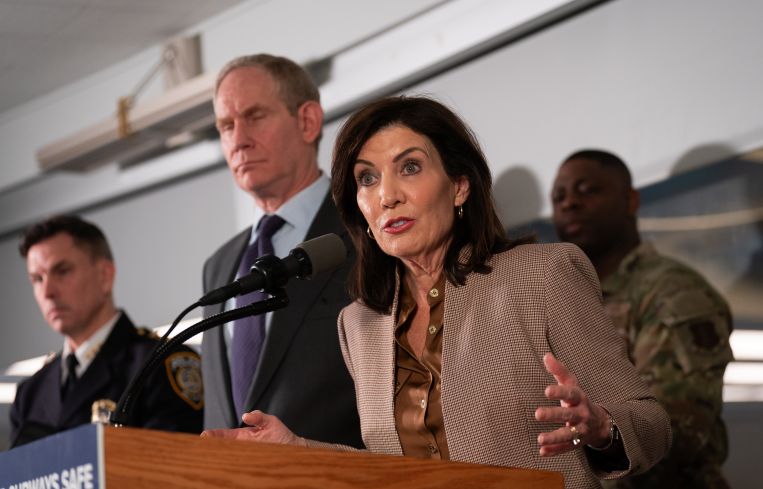Real Estate Joins Chorus of Criticism Toward Hochul’s Congestion Pricing Pause
By Mark Hallum June 6, 2024 5:28 pm
reprints
Gov. Kathy Hochul is jumping over dollars to pick up dimes it seems with the recent decision to shelve New York’s almost decade-in-the-making congestion pricing program.
While New Yorkers have dreamed of a congestion toll for Manhattan since at least Mayor Michael Bloomberg’s administration, the iteration that Hochul paused at the zero-hour on Wednesday had been in the works since the great transit meltdown of 2017 and had at least $550 million already invested.
With the tolling cameras above entry points to Manhattan below 60th Street now peering over the streets with lifeless eyes, real estate industry leaders may be refraining from the advocates hurling terms like “coward” and “betrayal” at the governor, but the pause is far from what they wanted.
“Congestion pricing will provide environmental and transportation benefits that will make New York City more competitive on the national and international stage,” the Real Estate Board of New York said in a statement. “Any delay in its implementation should be of a limited duration.”
Others in real estate — which has generally supported congestion pricing before — haven’t been as outright with their opinions on Hochul’s delay. Gabe Marans, vice chairman at Savills North America, said it’s too early to tell if congestion pricing’s pause will be detrimental to the region economically, but the fact that a portion of commuters drive into Manhattan for work — small though it may be — is something to consider.
Before you can reduce congestion, you have to give people access to safe mass transit and the state doesn’t seem to be able to provide that until they have a stable funding stream for improvements, Marans told Commercial Observer.
In a pre-taped video, Hochul claimed congestion pricing would hurt low-income commuters and damage Manhattan’s recovery from the pandemic. A more believable excuse for onlookers is based on an initial report from Politico, stating that the delay was more politically driven toward helping Democrats retake a majority in Congress at the behest of U.S. Rep. Hakeem Jeffries of Brooklyn, who has denied playing a part.
To make up the estimated $1 billion congestion pricing was expected to funnel into the state coffers, Hochul instead proposed increasing the payroll mobility tax (PMT) on businesses within New York City, according to The New York Times. That’s something government watchdog group Reinvent Albany believes isn’t a solid replacement for congestion pricing and could hurt workers as well. State lawmakers also don’t seem keen on it and indicated they would kill the proposal, Politico reported.
Hochul has also pinned the decision to pause the toll in Manhattan’s central business district (CBD) on not wanting to impact companies mandating return-to-office for employees.
The Regional Plan Association, another organization advocating for congestion pricing to proceed, crunched some 2023 data from the U.S. Census Bureau and found that 26 percent of commuters from Hudson Valley drive into the CBD, while 24 percent of Long Islanders would have to pay the toll. Seventeen percent of commuters from New Jersey are motorists versus 12 percent from Connecticut and 10 percent from within the city.
Government watchdog group Reinvent Albany believes the PMT increase, which would require a seemingly unlikely majority vote from Albany lawmakers, isn’t a solid replacement for congestion pricing and could hurt workers as well.
“We remind the Legislature that the Long Island Rail Road is getting 10 percent, or $1.5 billion, and Metro-North Railroad is also getting $1.5 billion from congestion pricing as part of the 2020-2024 capital plan,” Reinvent Albany said in a statement. “It is absurd to ask only NYC employers — who will pass this on to employees –—to foot the bill for them.”
In the process of trying to help Democrats win on the national stage, Hochul has gathered support for her decision from people and organizations that may not be the most desirable for a Democrat, such as a mostly conservative New York City Police Department union, the Police Benevolent Association, and former President Donald Trump.
From a political standpoint, Hochul’s decision seems on shaky ground. From an economic perspective, it looks even shakier.
“This decision is misguided,” Rick Geddes, a professor of economics at Cornell University, said in a statement. “Gov. Hochul’s decision is disastrous to both the city and the broader economic region since the benefits of free-flowing traffic and faster commutes outweigh the costs.
“Some cite concerns about ‘equity’ associated with congestion pricing, but traffic congestion itself disproportionately hurts the poor, with city buses and other public transportation stuck in bumper-to-bumper traffic.”
The toll structure — $15 per day fee for cars entering Manhattan below 60th Street and $24 or $36 per day for trucks — was determined by the Traffic Mobility Review Board that was composed of public servants who had immense track records in the real estate industry.
It included Carl Weisbrod, the former head of the New York Department of City Planning and senior adviser at HR&A Advisors, REBNY President Emeritus John Banks, Velez Organization President Elizabeth Velez, and Kathryn Wylde, the president and CEO of the Partnership for New York City.
Wylde’s organization criticized the delay, pointing out that taxes on businesses account for 44 percent of MTA revenues and 27 percent comes from riders, while only 13 percent from drivers — “an inequitable allocation that congestion pricing would have helped correct,” the Partnership for New York City said in a statement.
“Congestion pricing spread the MTA funding burden equitably across all the constituencies that benefit from the mass transit system that supports the tri-state regional economy,” the group added. “The PMT burden is entirely on New York City, which is already the most highly taxed city in the country.”
Mark Hallum can be reached at mhallum@commercialobserver.com.



